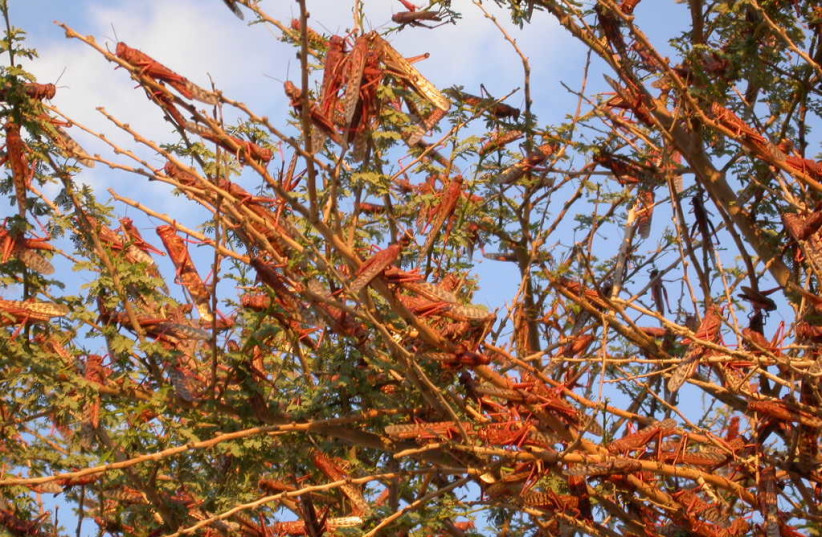Gut bacteria may be what causes locusts to gather in swarms, according to a new study by researchers from Tel Aviv University and Haifa University.
The researchers found that a bacteria called Weissella was nearly absent from the gut microbiome of solitary locusts, but became dominant when locusts joined a group. A specially developed mathematical model indicated that swarming may give these bacteria evolutionary advantages, allowing them to spread and infect large numbers of locusts.
"Our findings do not prove unequivocally that these bacteria cause locusts to swarm and migrate. They do however lead us to propose a new hypothesis – that the microbiome, and specifically the Weissella bacteria, play an important role in inducing the locusts' aggregation behavior," said the researchers.
"We hope that this new understanding will drive the development of new means for combating locust outbreaks – still a major threat to countless people, animals and plants all over the globe."
The researchers tested their hypothesis by examining the gut microbiomes of locusts born in the laboratory and found a profound change when solitary individuals joined a large group of about 200 locusts.

The researchers then developed a mathematical model to analyze the conditions under which locust swarming produces significant evolutionary advantages for the Weissella bacteria, allowing it to spread to numerous hosts. This led researchers to hypothesize that the bacteria could play an important role in causing locusts to swarm.
"Locust swarms that decimate all crops in their path have been a major cause of famine from Biblical times to the present," said TAU's Prof. Amir Ayali, one of the lead authors of the study.
"Over the last three years, large parts of Africa, India and Pakistan have been hard-hit by locust outbreaks, and climate change is expected to exacerbate the problem even further," he said.
"Locust swarms form when individual locusts, usually solitary and harmless, aggregate and begin to migrate. However, the causes for this behavior remain largely unknown, and an effective solution is yet to be found. Following recent studies, indicating that microbiomes can influence their hosts' social behavior, we hypothesized that locusts' microbiomes may play a role in their aggregation behavior."
Ayali co-led the project with PhD student Omer Lavy from the School of Zoology at TAU's George S. Wise Faculty of Life Sciences, Prof. Lilach Hadany, Ohad Lewin-Epstein and Yonatan Bendett from the School of Plant Sciences and Food Security, and Prof. Uri Gophna from the Shmunis School of Biomedicine and Cancer Research at the Wise Faculty and Dr. Eran Gefen from the University of Haifa-Oranim participated in the study.
"Our study contributes to the understanding of locust swarming – a leading cause of famine from antiquity to the present," Ayali said.
"Our findings do not prove unequivocally that the Weissella bacteria are responsible for the swarming and migration of locusts," he said. "The results do however suggest a high probability that the bacteria play an important role in inducing this behavior – a new hypothesis never previously proposed. We hope that this new understanding will drive the development of new means for combating locust outbreaks – still a major threat to countless people, animals, and plants all over the globe."
Especially large swarms of desert locusts have plagued East Africa, the Middle East, Central Asia and India since 2019, with the Food and Agriculture Organization of the United Nations reporting last week that the upsurge had finally begun declining after over two years.
FAO added in the update that it does not expect any significant increase in locusts in the near future, but suggested vigilance during February.
The locust upsurge in recent years decimated hundreds of thousands of hectares of land, contributing to a food crisis fueled by the coronavirus pandemic, poor rainfall and armed conflict.
